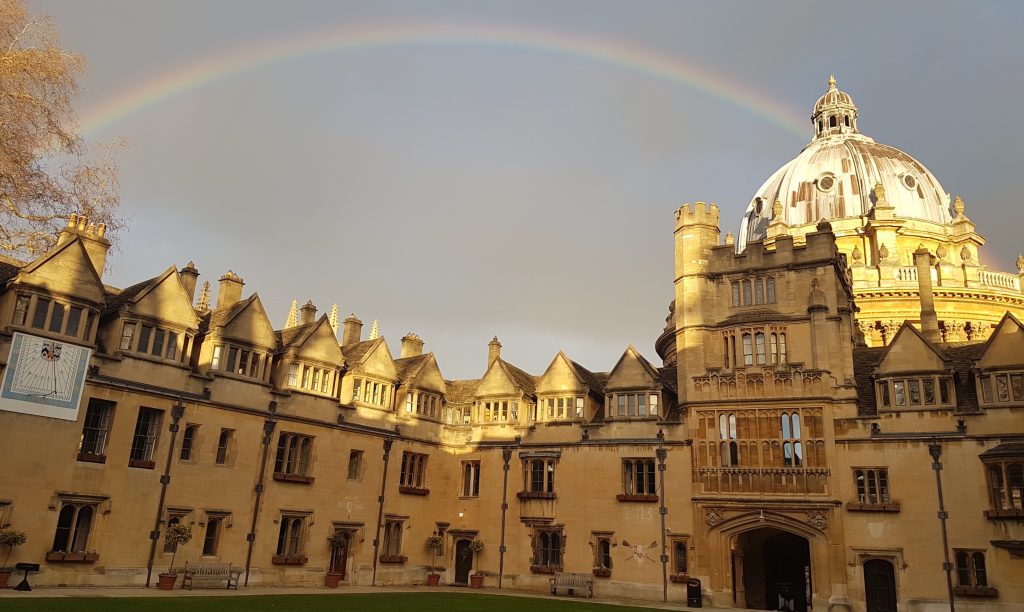
I spent nine years doing three degrees at the beautiful, but highly unusual, University of Oxford. My “Oxford experience” featured many peculiar ancient traditions, getting to grips with dress codes and a unique language, plus overcoming some tough challenges.
For many reasons, I probably didn’t have what could be thought of as a “regular” student experience. One of those reasons was that I studied at the oldest University in the English-speaking world, established over 900 years ago in the 11th Century.
Oxford has an unusual structure, following an old-school collegiate system, whereby students belong to (and often live in) one of over 30 colleges, while also attending lectures in subject departments. I studied Geography at Brasenose College (pictured above), established in 1509, which has produced some notable clever-clogs alumni; including two former Prime Ministers, Nobel Prize winning author, Sir William Golding, and the legendary member of Monty Python, Sir Michael Palin.
My experience was also shaped by my identity as a state school educated, Northern, female, socialist, Goth- hardly the stereotype of an Oxford student, often portrayed in popular culture as posh and conservative! Here I share some of my personal insight, and in classic unpopcultures style, I’ve pulled out six of the perhaps more unexpected elements…
1. Historical traditions are very much alive
my absolute favourite tradition involves an epic grudge, a secret passageway, and free beer…
The history at Oxford is really felt, not just in the hundreds of beautiful old buildings in which you study, eat, sleep, party, and take exams, but in the plethora of weird traditions that have stuck around for centuries. There are so many, but my personal favourite tradition involves an epic grudge, a secret passageway, and free beer…
Each year at 11am on Ascension Day (39 days after Easter Sunday), the door to a small tunnel linking Brasenose College to the kitchens of neighbouring Lincoln College is unlocked for 10 minutes. Brasenose students are allowed to pass through and enter the Lincoln bar for a complementary pint of ale, spiked with ivy. Sounds pretty sweet, if a bit weird, but why has this been going on for centuries?
The most widely accepted story is that a Brasenose student was being chased by a group of angry townsfolk down the High Street (the students and locals have famously antagonised each other over the years, a status now formally recognised in the annual “Town versus Gown” boxing match held at the Oxford Union!). This fleeing student pounded desperately on the door of the first college he reached- Lincoln- pleading to be let in. They refused, leading to his capture and subsequent lynching at the hands of the angry mob.
As penance for this unneighbourly behaviour, Brasenose students were permitted to enter the Lincoln bar and drink it dry of ale (this being the popular tipple back in the 1700s). The story doesn’t stop there: unhappy with the expense and inconvenience of running out of ale, the cheeky folks at Lincoln started to add crushed Ivy to the beer, which gives an unpleasant taste and causes stomach upset if imbibed in large quantities. Thus, the drinking was curtailed and a more reasonable penance was paid.
I remember attending my first Ivy Ale celebration, queuing up in the corner of Old Quad and dashing through to Lincoln’s bar, and listening to the story behind the practice. Perhaps it was the Ivy Ale making me delirious, but this was one of the most mental days in my Oxford calendar!
2. Student life is intense!

Pulling an all-nighter to finish an essay (my actual desk as an MSc student)
It might not be surprising to hear that it’s hard work being a student here, but there are some specific peculiarities that make student life, particularly for undergraduates, very intense.
Firstly, undergraduate teaching at Oxford is based around college tutorials and departmental lectures (plus lab practical sessions if you’re a scientist). Undergraduate students belong to one of over 30 colleges, and each week they will prepare an essay for discussion in a tutorial. These are hour-long sessions where the ideas and reading for the week are debated between small groups of usually four students and a college lecturer. You are expected to have an opinion and blagging through is easily spotted, so yes, this can be pretty scary!
Secondly, an academic year is made up of just three terms of eight weeks in length, where everyone living in college must move in and out again at the end of term. This isn’t a lot of time to cram in all the learning, socialising, political activism, sports, partying etc. of student life! Each week of term is labelled “0” to”8”, and there is the phenomena called “5th Week Blues” smack in the middle, where many student feel extremely tired and quite frankly, start to lose it a bit.
Thirdly, there are college exams on the first Saturday morning at the start of each term- yes, SATURDAY! To me, while it initially seemed cushy to have 6 weeks of holiday, in reality my routine was as follows: come home to my parents’ house, get sick for the first two weeks, then spend four weeks working and revising for exams, then pack up and make the drive back from Manchester.
for me, it was the epitome of “work hard, play hard” lifestyle…
Contrary to images in Brideshead Revisited of quaffing champers while clutching a teddy bear, my experience was one of intense relationships that often lasted for just one term, putting my heart and soul into different student societies, and lots of packing and unpacking. There were many hours spent working in draughty libraries and brilliant parties in college wine cellars – for me, it was the epitome of “work hard, play hard” lifestyle.
3. Dress codes

Me wearing sub fusc in 2007
Perhaps something that is quite reminiscent of Brideshead Revisited are the dress codes that are still in place at Oxford. This isn’t like Eton College, where students walk about in top hat and tail coats every day- Oxford students can wear what they like most of the time, but there are dress codes for formal University occasions (Matriculation, Graduation etc.), plus formal dining and, to my biggest surprise: exams!
The dress code for formal University occasions is called “Sub Fusc” (apparently from the Latin sub fuscus meaning “dark brown”). Although the gender rules have been appropriately relaxed recently, the predominant outfits are comprised of a dark suit, white shirt, white bow tie, black socks and shoes for men, and dark skirt/trousers, white shirt, black ribbon tie, black tights/socks and shoes for women.
Everyone then wears a sleeveless academic gown over the top, which is the essential bit of the kit. This is worn over smart-casual clothing for formal dinner which served in college halls three times a week, but useful mainly for cycling about with it flapping in the wind, pretending you’re a superhero!
These rules were pretty strictly enforced, even down to the colour of socks…
Dressing for dinner and formal occasions I’d heard of and expected, but dressing for exams was a new one for me! For exams, students are required to wear full sub fusc, plus carry an academic hat- a mortar board or soft cap. However, as someone who has not graduated yet, you are not permitted to actually wear this hat (subject to a fine), and must simply carry it and place it on the exam table. These rules were pretty strictly enforced, even down to the colour of socks- one chap from my college wore his lucky college rugby socks and was disciplined as they were black and gold stripe not plain black!
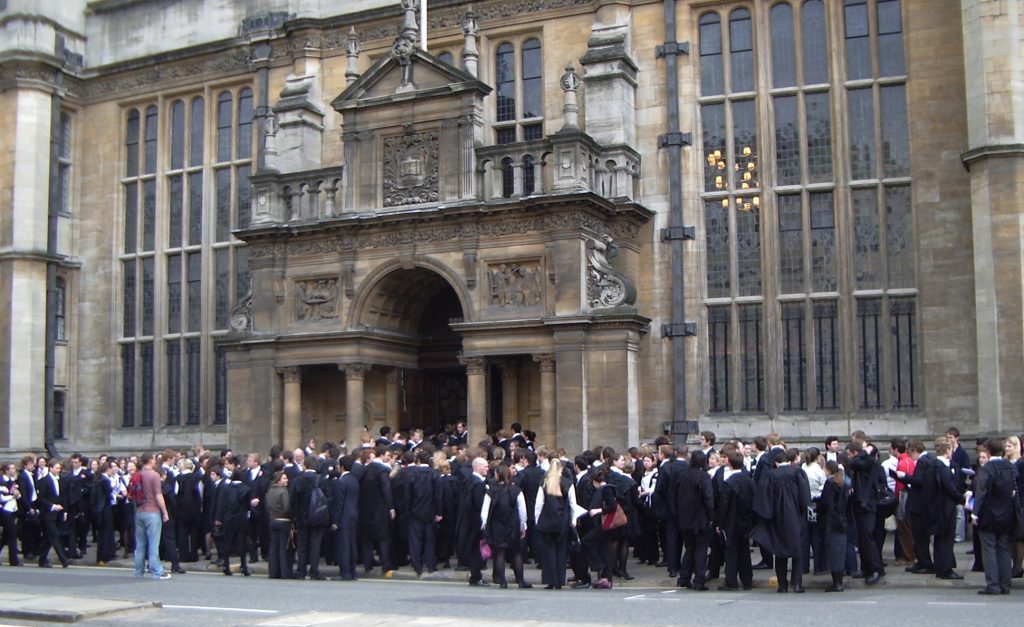
Students in sub fusc waiting to enter Exam Schools to take Finals…I’m in there somewhere!
While the “hat that must not be worn” rule seemed pretty random, my favourite part of exam uniform was the wearing of a carnation, colour-coded to the stage of the examinations: for your first exam, you wear a white carnation, pink for the intermediate exams, and red for your final exam. I can’t tell you how lovely it was to wear that red carnation!
By my PhD, I’d managed work the system a bit and inject my own personal style into this uniform: a fitted Lip Service shirt with black PVC straps (that could just be concealed by the gown), seamed stockings, and killer heels! There are also much more fancy gowns worn for graduation- the Doctoral gown is particularly colourful, and certainly won’t be winning any style prizes…

Wearing a red carnation on my last day of Prelims in 2004, DPhil (PhD) graduation in 2012
4. Unique language
As you can tell from terms such as sub fusc, there is a plethora of unique terminology and language at Oxford. In my welcome pack before my first term, I was even sent a glossary to help me understand what was going on!
Here are some of my favourite bits of Oxford lingo:
| Collections | college exams at the start of each term. |
| Battles | the college bill, including University fees, accommodation, meal card expenses etc. |
| Scout | the cleaner that will collect bins every morning and vacuum/dust student rooms every week. |
| Lodge | the staffed entrance to each college. |
| Porter | the staff working in the lodge at each college. |
| Michaelmas, Hilary, Trinity | the names of each of the the terms throughout the year. |
| O week, 1st week etc. | the names of each week of term – calendar dates don’t get used at Oxford e.g. you would say the coursework is due on Tuesday of 4th week in Hilary term rather than 20th February. |
| Coming up/going down | students always “go up” to Oxford for the start of term and down at the end, irrespective of geographical location (as a Mancunian Geographer this was quite irritating!). |
| Rustication | to be “banned” or excluded from the University for a period of time following a disciplinary issue. |
| JCR | the Junior Common Room, a recreation space for undergraduates. |
| DPhil |
Doctorate of philosophy- unique Oxford term for a PhD degree. |
| Gaudy | a reunion dinner for alumni, usually held once every 10 years. |
5. “Imposter syndrome“ is very common
It’s tough to get a place to study here, with many more A-grade students applying for each place; the ratio of undergraduate applicants to places was 4:1 for my course in my college, and it’s even higher now (closer to 7:1). There is also an intimidating list of notable alumni including Stephen Hawking, Oscar Wilde, Adam Smith, J.R.R. Tolkien, Sir Roger Bannister, and 27 British Prime Ministers to date. Add to this the fact that many students throughout history have come from privileged backgrounds, and there is the common misconception that Oxford students must be super over-confident and even arrogant.
I went from placing amongst the top achieving students at school, to being distinctly average…
Of course some are like this, but for many, including myself, the experience can be actually quite the opposite! I went from placing amongst the top achieving students at school, to being distinctly average or near the bottom of the pack in some topics. Add to this the opening up to new subject knowledge – the sense that the more you know, the more you realise how much there is yet to learn! This was an unsettling and overwhelming feeling for me, and I found it difficult to retain self-confidence.
I remember receiving high 2:1 grades (not the highest grade of a First) in my initial term and getting upset as I’d been used to top marks for years. I felt that I’d failed, that they must have let me in by accident, and I was afraid they’d “find me out” and ask me to leave. At times, I even came to resent the beautiful architecture that tourists enjoy, as it heightened the pressure of 900 years of history and an imperative to not “let the side down”.
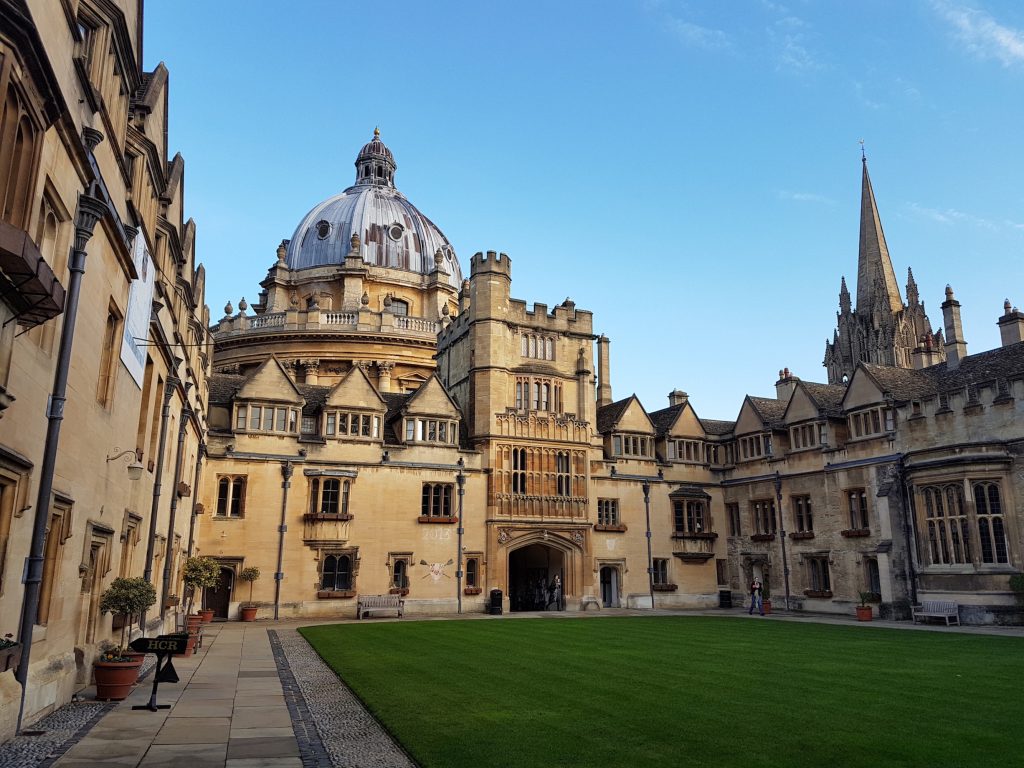
Beautiful but also intimidating university buildings…
I ended up seeking help from the brilliant University counselling service. In my first session, I explained how I’d been feeling and my counsellor said: “that’s called imposter syndrome– it’s amongst the most common things that we give advice on here”. I was completely shocked that many fellow students must feel like this, but it was reassuring to hear that I was by no means alone! I’m happy to say that with support from a counsellor, my particularly awesome college Geography Fellow, and friends and family, I was able to understand and manage these feelings, but it was a challenging journey for me at times.
6. Oxford embodies a meeting of old and new
Despite the old-school traditions described here, I also found Oxford a very “modern” place, accepting of difference and diversity. While many of our upper class, white, male, conservative politicians have come out of this system, this demographic and value system certainly didn’t dominate my experience or friendship spheres.
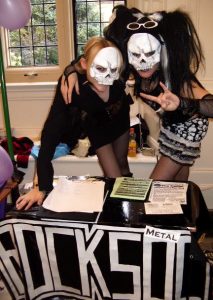
Representing RockSoc at Freshers’ fair, 2004!
I’m also proof that it is possible to avoid the more stereotypical activities like rowing: my friends and I resurrected the Rock Music Society (RockSoc), set up a club night, DJed, booked bands to play live, and presented a weekly alternative music radio show. I also spent my time campaigning with People and Planet (the highlight was participating in a fair trade debate with the then CEO of Nestlé), and started learning Japanese with the Japanese Society.
I discovered an enduring love of partner dancing, beginning with Ballroom and Latin. Some of my favourite memories are booking my 17th Century college chapel for a “music practice”, and ploughing up and down the marble floor practicing my Cha Cha Cha lock steps under a ceiling designed by Sir Christopher Wren, with Ricky Martin music booming out!
My Goth identity was not only tolerated but actively embraced at my college and department…
Equally, my Goth identity was not only tolerated but actively embraced at my college and department. I completed two dissertations on Goth subculture, the first of which was entirely due to a Professor of human geography encouraging me to look at globalisation and culture through this lens, and I won departmental support to successfully bid for full funding for my PhD on the same subject.
Even at possibly the most traditional institution, The Oxford Union (the famous debating society founded in 1823), I have seen some diverse speakers. My favourites were feminist icon, Germaine Greer; Brendan Cole, a pro-dancer from Strictly Come Dancing; Brandon and Mike from Incubus; and even burlesque legend and my personal style inspiration, Dita Von Teese!! Contrast this to when Her Majesty the Queen visited my college for our quincentenary, and this pretty much sums things up!
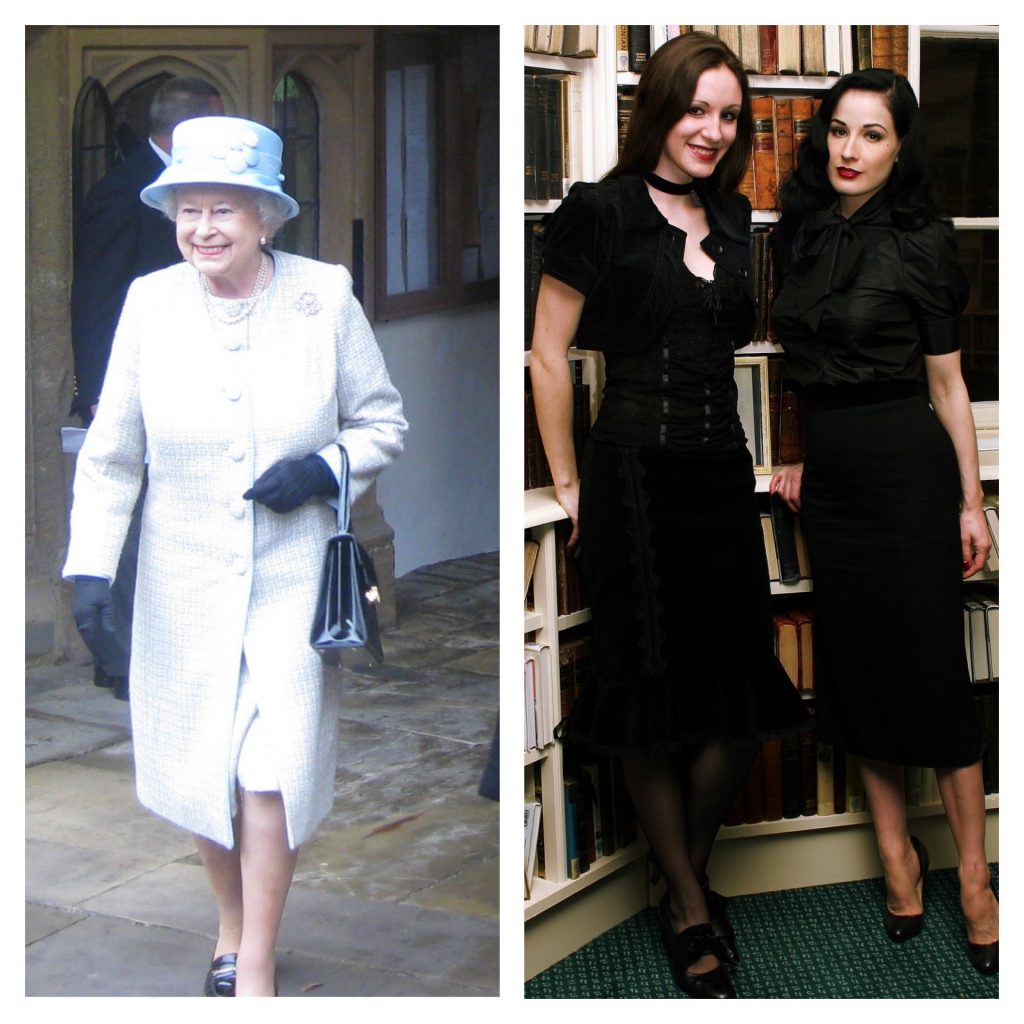
HM The Queen and the Queen of Burlesque, Dita von Teese!
My Oxford experience was quirky, occasionally surreal, very tough at times, but one that has opened up my eyes to different ways of being and helped to shape me as a person. I learned not only in which direction to pass the port around the table after dinner (left), and how to crack out a mean Cha Cha on the dance floor, but also how to speak with people of different backgrounds and debate ideas respectfully within a group. I emerged as “Dr Goth” with an enduring curiosity and appreciation for the unusual- something I’ll always be grateful for!
Thanks for reading! Hit Follow to receive brief notes letting you know that I’ve posted a new article, and in the meantime, check out the Instagram and YouTube channels for more (Un)Popular content!
As an Oxford student myself, I can say this article perfectly captures the weird and wonderful experiences we go through – definitely worth a read!